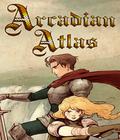It can be tough to recapture a classic. A game that stands the test of time has something unique that simply can't be replicated; characters, gameplay, plots and presentation all impact the final product. To this day, Final Fantasy Tactics remains one of the most iconic strategy-RPGs, and it's understandable why longtime fans would want to do their own FFT. Arcadian Atlas is bluntly one such game, and unfortunately, it proves one thing: It isn't easy to follow in the footsteps of a giant.
Arcadian Atlas follows a pair of star-crossed lovers, Vashti and Desmond, who were both soldiers in the Kingdom of Arcadia. The king was murdered, and the princess of the land accused her own stepmother of the deed. Before long, the two find themselves on different sides of the conflict, struggling to hold true to their ideals while also preserving their love. As civil war brews, they'll have to decide what is important — even if it means potentially abandoning the other to their fate.
The story is probably Arcadian Atlas' strongest part. It isn't groundbreaking, but the core idea of lovers being on opposite sides of a war is cool, and the game adds some interesting twists and leaves some moral ambiguity on the table. It's somewhat predictable but engaging enough that I was glad to see it through. However, it is incredibly depressing for a game where you can play as a cute, sword-wielding raccoon. It provides enough texture to keep you invested, but the tragedy can occasionally become too predictable.
The gameplay in Arcadian Atlas is obviously inspired heavily by Final Fantasy Tactics. It's a turn-based strategy RPG where you and the enemies take turns beating the living crap out of one another. Arcadian Atlas' combat isn't particularly complex or involved; it's about as standard of a combat system as you can get.
Arcadian Atlas runs into the same problem that a lot of Final Fantasy Tactics clones do, where the class selection is pretty boring. You get the standard lineup: archers, fighters, healers, mages, etc. They can further specialize in different ways, such as a healer focusing on damaging poisons and such. Unfortunately, most of the skills aren't very fun or effective. You can try to build for overlapping synergy, but you can also set up a squadron of archers and a healer or defender. That lets you poke everything from a distance, which ends up being incredibly effective and faster than most other options. Even if you forgo this tactic, the combat isn't particularly interesting.
This is one of the biggest problems with Arcadian Atlas. No real tactics are required. Terrain barely matters to combat, except when it hurts melee fighters while having little to no real impact on ranged fighters. Rather than feeling like a tradeoff, it feels like there's no reason to use anyone who can't attack from a distance. It's imbalanced in a way that isn't very fun and doesn't give the player a lot of room to pick their favorites. Most of the skill upgrades are small numerical bonuses, which are almost always the least fun you can have with a skill tree.
That's really the core problem. Final Fantasy Tactics wasn't a difficult game, but it provided a lot of different options for how to have fun with your cast. You could make a brutally fast dual-wielding ninja, a teleporting mage, talk enemies into retreating or use the power of math to nuke every enemy on the battlefield. Arcadian Atlas copies the basic system but lacks any of the fun in character builds, while also not feeling very demanding in the strategy department. This isn't a problem unique to Arcadian Atlas, but the constant similarities to Final Fantasy Tactics run into that oh-so-common problem of spiritual successors: It keeps making me want to play a different game instead.
Beyond the combat and story, there isn't much to the game. You go from area to area and fight, occasionally pausing to do contract missions, which can earn some bonus experience points. It's a pretty brief game, and while there are some options that encourage replay, such as some choices that make some alterations to events, they're not enough to encourage a second playthrough. It's really going to be a one-and-done experience for most players.
Graphically, the game looks an awful lot like Final Fantasy Tactics. The sprites are nicely animated and look crisp and clear. Some of the combat animations feel lackluster and could use more spice. The environments are bland grays and browns that serve their purpose but have a lot of room for improvement. The soundtrack is odd, going for a heavily jazz-influenced tone, rather than anything more traditional. I think the music is excellent, but I'm not really sure it fits the setting; it sometimes feels like it wandered in from another game.
Arcadian Atlas is the definition of a fine game. It isn't bad, and it isn't great; it's just perfectly passable. There are some solid moments and a nice hit of nostalgia for PS1-era RPGs, but that's about it. Other spiritual successors like Triangle Strategy and Fell Seal have proven that the genre can do a lot more on a lower budget, and Arcadian Atlas feels dated. If you're a fan of SRPGs, this might be worth a look, but it's mostly forgettable.
Score: 6.0/10
More articles about Arcadian Atlas










 Arcadian Atlas is a 2D isometric tactical role playing game about the choices people make in pursuit of the things they love, and the havoc it wreaks on a kingdom.
Arcadian Atlas is a 2D isometric tactical role playing game about the choices people make in pursuit of the things they love, and the havoc it wreaks on a kingdom.




























